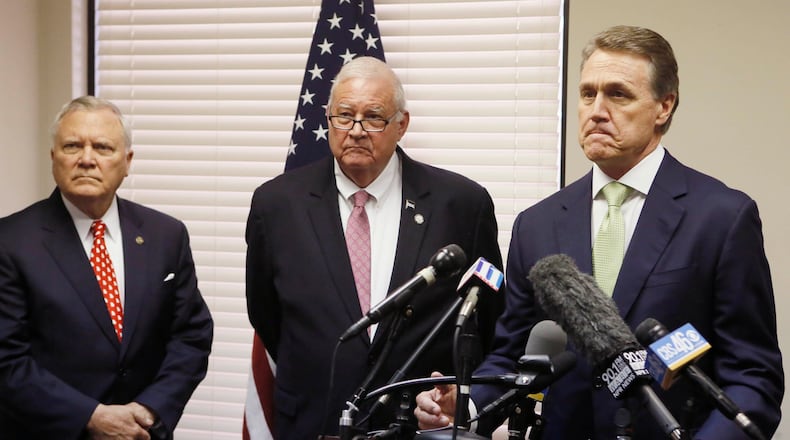The Georgia GOP should be flush with cash. Republicans control every branch of Georgia government and all the trappings of power that come with it. But the party’s finances are still in the tank — and that could have big implications in the fight over the organization’s future.
Federal financial disclosure data filed after the election show the party had about $126,000 in cash on hand and roughly $227,000 in debt — a far cry from the millions of dollars the state’s dominant political party once commanded.
Election victors are usually in the pole position to refill their campaign coffers after the votes. And Georgia Republicans have had a string of successes, sweeping every statewide office in 2010 and 2014, cementing U.S. Sen. Johnny Isakson’s victory and delivering Donald Trump a 5-point win in November.
And yet the party’s financial fortunes have fallen since 2010, when it had about $2 million in the bank. And while the bank account has recovered from a nadir of just $11,403 in December 2015, some Republican officials are raising sharp questions.
“The Georgia GOP is broke,” said Alex Johnson, who is running for a third time to lead the organization. “We cannot advocate fiscal responsibility while spending more than we take in. We must lead by example if we expect to raise money and remain solvent.”
Even more galling to Republicans: The state Democratic Party, which has recently suffered from its own fundraising problems, was in a healthier financial position. A filing in October showed it had nearly $400,000 in cash and virtually no debt.
State Republican Party Chairman John Padgett, who was first elected in 2013 and won’t run again next year, has leaned on former U.S. Rep. Jack Kingston to help restock the GOP coffers. An event featuring ex-Texas Gov. Rick Perry in June was one of the top draws, but others, including a planned “Second Amendment celebration” in late 2015, were scrapped.
Padgett’s supporters point to the November election results, noting that Isakson and nearly every other GOP incumbent won smashing victories.
“Clearly, we have the infrastructure, grass-roots support and, yes, finances to grow the party, promote conservative principles, win elections and protect our red-state status for years to come,” Georgia GOP spokesman Ryan Mahoney said.
Lawsuits and legal questions
Several pending lawsuits seeking hefty judgments have complicated the party’s fundraising efforts.
Former Georgia GOP employee Qiana Keith filed a lawsuit claiming that one of the organization’s employees humiliated her and referred to her with a racial slur.
And Padgett was targeted with another complaint alleging he has reneged on more than $340,000 in outstanding legal fees owed to his former law firm that were incurred in defending himself against Keith’s lawsuit.
“There is nothing wrong with the Republican Party in Georgia; there is a lot wrong with the Georgia GOP organization,” said Harry Abrams, a member of the state GOP committee. “I’m telling people if they’ve got a candidate you’re interested in, contribute directly to the candidate. Because only God knows what the state is doing with it.”
The Georgia GOP’s financial disclosure shows that it spent $17,000 in 2016 on legal fees with Dentons, the powerful law firm with many Republican clients. It owes more than $200,000 to the law firm of the party’s general counsel, Anne Lewis.
The legal expenses and other financial problems have frustrated some longtime party activists. Nathaniel Darnell, a state GOP committee member, posted a lengthy dispatch on Facebook claiming that party leaders were “chronically irresponsible” with party funds.
“It is disgusting that these people (and other cowards on the state executive committee) stood idly by and watched the state GOP burn like this under their watch,” he wrote.
The party’s often-testy relations with state leaders — most notably Gov. Nathan Deal — also haven’t helped.
Party activists snubbed Deal in 2011 when they elected Sue Everhart to another term as party chairwoman over the governor’s handpicked candidate. And they fell apart when many grass-roots activists called for a formal rebuke of the governor after his vetoes of “religious liberty” and campus gun measures — one district even called for a censure.
Deal didn’t attend the party’s convention this summer, citing an event with high school valedictorians at the Governor’s Mansion.
Chip Lake, a veteran Republican strategist, said the organization’s problems send a message to the party’s next leader: Don’t “stick a finger in the governor’s eye.” He and others also warn that rivals, such as independent expenditure committees that can work on behalf of candidates and target their opponents, further diminish the party’s role.
“While you always want your state party to be in a strong financial position, I’m not so sure it matters as much as it used to with the emergence of independent political committees,” Lake said. “Many of these independent committees come in and play the role that, 10 to 15 years ago, the state party would have played.”
Johnson and other candidates lining up to replace Padgett in 2017 are dreaming up new ways to strengthen the party.
Michael McNeely, the party’s vice chairman and a contender for the top job, vowed to be a strong financial steward. Several others scouting the race, including grass-roots organizer Scott Johnson and GOP operative John Watson, are also likely to jump in.
Rusty Paul, the mayor of Sandy Springs and a former GOP chief, said the next leader must be able to raise cash while also uniting different factions of the fractious party.
“We need the full conservative coalition working together to ensure the GOP keeps its competitive advantage into the foreseeable future,” said Paul, who supports Watson for the job.
About the Author
Keep Reading
The Latest
Featured




